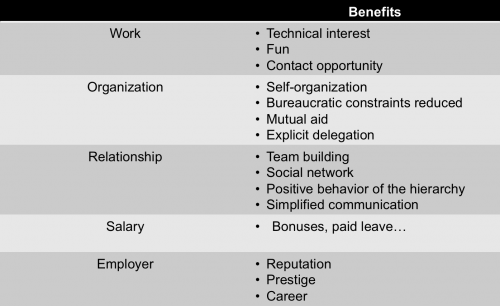 Nothing new when you say that management is more important than the tools, even if they are social. That’s why social business is more focus on management model than tools. Usually peoples highlights the work of Peter Drucker to talk about management. In France one of our though leader about those question of organization is Michel Crozier.
Nothing new when you say that management is more important than the tools, even if they are social. That’s why social business is more focus on management model than tools. Usually peoples highlights the work of Peter Drucker to talk about management. In France one of our though leader about those question of organization is Michel Crozier.
As noted by the Nobel Prize in Economics in 1978 Herbert H. Simon, every situation is experienced as a specific problem: « What to do? « Each behavior is the best or the least bad solution to the problem in terms of the issues and constraints of the situation, available resources, experiences, information, etc.. Behavior is always rational (even if it seems unreasonable to others) because each player chooses a solution based on its « bounded rationality ».
In this context, strategies remain behaviors serving motivations of the individual. Without developing further the strategies it induces can be summed up in the fact that everyone reacts to arrive at what the pros outweigh the cons, the positive to the negative. In this part of the sociology of organizations, an analysis grid has been developed WORSE (Work, Organization, Relationship, Salary and Employer)
We are not here to take a thorough analysis of an organization using the WORSE grid, but rather to see how social business can bring positive responses to individual motivations (although for this post, this approach is somewhat outlined, and we only focus on the benefits, not the disavandtages part of the grid). The premise is to find a management and organization mode to take advantage of social tools and uses within the company to enforce at least the commitment.
Work:
- The establishment of an enterprise social network will help employees to develop contacts
- Gamification is more and more a component of enterprise social network, and the triggers of the social network is close from gaming too
Organization:
- Collaboration, for instance through the establishment of community or practice or social learning process will help to develop skills and increase mutual aid
- One of the basis of the social business is the employee  empowerment which lead to self-organization
- The collaboration strive to delegate task to people, and oppose to micro-management
Relationship:
- All items in the grid are the driver of an enterprise social network in a social organization that intensify interaction between individuals. I’m not going to describe all the items, you could copy and paste what is described for the Work and Organization part and even get more.
Salary :
- If employees work more collaboratively, managers must ensure that individual objectives evolve according to expected uses. So clear objectives related to social activity or employee engagement in social practices and collaborative can give meaning and value of these actions
Employer :
- Internal reputation and recognized expertise through the enterprise social network
- Personal branding with the involvement on external social network (e-ambassador)
- Many studies and uses cases show that an enterprise social network can be used to a better talent management and career management with a better view of the skills, and a pro-active part more important from the employees
To conclude, the use and practices, management and organization associated to social business, can respond positively to a number of motivating staff, encouraging their involvement in the structure, because they find positive answers to their « personal strategy ». You have the keys to answer to the grid analysis of Michel Crozier to get a more efficient organization where people are more happy too. A win-win situation at the end, so what else…

